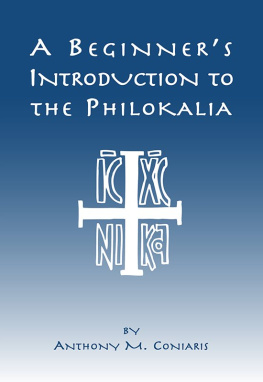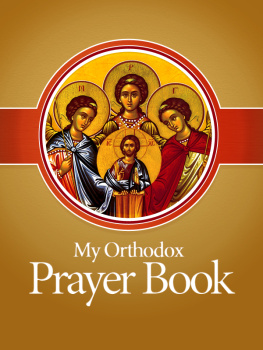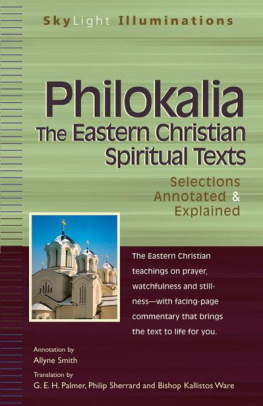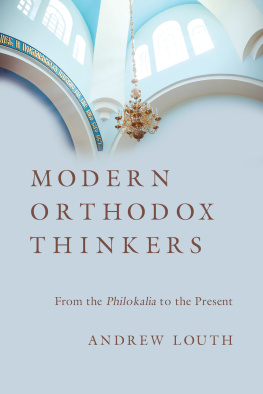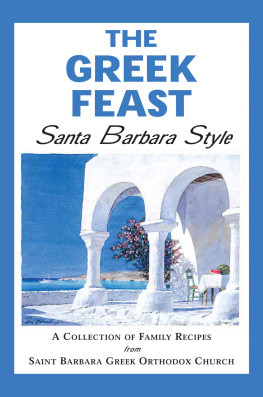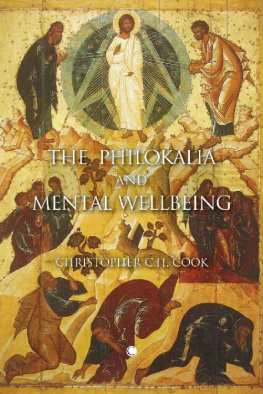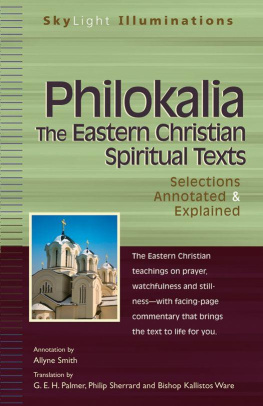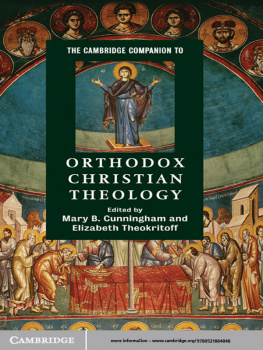The Philokalia and the Inner Life
For Joy
A loyal wife brings joy to her husband
(Sirach chapter 26, verse 2a)
Acknowledgements
I am indebted to many people who have helped me with my research into the Philokalia . First and foremost, I must acknowledge my enormous debt to Andrew Louth. It was he who conceived this project, who recognised its links with my previous work and interests, and who invited me to work with him on it. Subsequently he undertook to be my PhD supervisor when we agreed that the project would involve my submission of a dissertation as well as preparing a book for publication. He has offered invaluable comments on all of the manuscripts, including the very earliest drafts. I have learned so much from his gentle but incisive wisdom and spirituality and his encyclopaedic knowledge of Christian theology.
Most of the writing, including almost all of the initial chapter drafts, was undertaken on Holy Island, whilst staying in Cambridge House as a guest of the Marygate Community. They have made me warmly welcome, even amidst some severe Northumbrian weather, and I have appreciated the rhythm of daily prayer at St Marys Church during my stays there. This has helped me to remember that thoughts and prayer really are linked inextricably, and that it is not possible to write on a subject like this with integrity without also being immersed in a community of prayer. The work was finished at St Deiniols Library in North Wales, with the support of a Richard L. Hills scholarship, and I am therefore also grateful for their generous hospitality.
The Leventis Foundation and the Society of the Sacred Mission have kindly supported my work on this project with generous grants, for which I am most grateful. It would not have been possible to undertake this work without their support.
I am very grateful to Kallistos Ware and to Renos Papadopoulos for their helpful comments on the PhD dissertation which became the basis for this book. I am grateful also to Andrew Powell for his comments on an early draft of the chapter on psychotherapy.
I am grateful to Liturgical Press for allowing me to quote material from The Sayings of the Desert Fathers, translated by Benedicta Ward: Copyright Sister Benedicta, 1975. Revised edition 1984. A Cistercian Publications title published by Liturgical Press, Collegeville, MN. Reprinted with permission.
Material from Evagrius of Pontus: The Greek Ascetic Corpus by Robert E. Sinkewicz (2003) has been used by permission of Oxford University Press, Inc.
Finally, I must thank my family for their love and support throughout the period of my work on this project, and especially my wife, Joy, who has often been in my thoughts and prayers. This book is dedicated to her.
Names & Abbreviations
Many of the names of authors of the Philokalia are susceptible to differing transliteration. The spellings employed in the English translation of the Philokalia have been used throughout in this book, except where quoting from other published work.
Many of the authors of the Philokalia are saints of the Christian Church, and are referred to as such in the text of the Philokalia . For simplicity, and to avoid making distinctions in the present context, they have been referred to here without the prefix of Saint or St. This also avoids the difficulty, as in the case of Evagrios, of deciding what to do when the person is recognised as a saint of one part of the Church but not another.
[Name] The use of square brackets around a name indicates that a text is attributed to the named author but that it is in fact no longer considered to have been actually written by that author. Unless otherwise indicated, this means that the true author of the text is now unknown.
Titles of works included within the English translation of the Philokalia have been abbreviated according to the list of abbreviations provided at Appendix 1.
Abbreviations used for titles of the works of Evagrios
FoundationsThe Foundations of Monastic Life: A Presentation of the Practice of Stillness (included in the English Philokalia as Outline teaching on asceticism and stillness in the solitary life )
To EulogiusTo Eulogius. On the Confession of Thoughts and Counsel in their Regard
Eight ThoughtsOn the Eight Thoughts
PraktikosThe Monk: A treatise on the Practical Life
On PrayerChapters on Prayer (included in the EGP as On Prayer: 153 Texts)
Other works of Evagrios, where mentioned, are referred to using their full title.
Other abbreviations
AL1 Andrew Louth (1996)
AL2Andrew Louth (2003)
BDEC Blackwell Dictionary of Eastern Christianity (Parry et al., 1999)
C&CRefers to the tabulation of versions of the Philokalia provided by Conticello and Citterio, 2002
DBDavid Balfour (1982)
DSRefers to the entry on the Philokalia in Dictionnaire de Spiritualit (K. Ware, 1984)
EGPEnglish translation of the Greek Philokalia (Palmer et al., 1979, 1981, 1984, 1995)
IH Irne Hausherr (1978)
LTN Letter to Nicolas
MEC A Monk of the Eastern Church (1987)
NCE New Catholic Encyclopedia (Mcdonald et al., 1981)
NGPNotes by Nikodimos in the Greek Philokalia (Andrew Louth, personal communication)
No. Number
NRSV New Revised Standard Version
ODCC Oxford Dictionary of the Christian Church (Cross and Livingstone, 1997)
OTSL On the Spiritual Law
RBW Righteous by Works
Ref Reference
TR Theophan the Recluse. Biographical notes from the Dobrotolubiye (Kadloubovsky and Palmer, 1979)
Vol Volume Number
References to the Philokalia
Where possible, references to works in the Philokalia are given citing the name of the author, the name of the work (using the abbreviated title in Appendix 1) and the paragraph number (preceded by #), followed by the volume and page references to the English translation in brackets. For example:
Mark the Ascetic in On the Spiritual Law , #85 (EGP , 116)
Where paragraph numbers are not provided (e.g. in the works of Peter of Damaskos), the name of the author and the titles of the work and portion of the work are given, followed by volume and page references to the English translation in brackets. For example:
Peter of Damaskos in Book II in VI. Hope (EGP , 227)
Prologue
As sheep to a good shepherd, the Lord has given to man intellections of this present world.
Evagrios of Pontus
Texts on Discrimination , #16 (EGP , 48)
Thoughts, like sheep, given the chance, are prone to wander aimlessly. Sheep follow one another, without any necessary sense of direction or purpose. They are often found gathered together in flocks, but each individual creature presents its own image of vulnerability and individuality. They get lost, and become sick or lame or hungry. But they can also be shepherded, thus gaining direction, and may be cared for, fed, and protected. A good shepherd will search out the lost, feed the hungry and care for the sick.
Such an image, particularly for those familiar with rural life, offers countless metaphorical and parabolic possibilities. Thus, most famously in the Christian tradition, Jesus is the good shepherd and we are the sheep of his pasture. Evagrios of Pontus (345/346-399), however, suggests that we are all shepherds and that God has given us thoughts or here intellections as sheep to be cared for.
It is a much neglected, and somewhat disconcerting, facet of the extended metaphor of sheep and shepherd, at least in relation to the New Testament of Christian scripture, that the sheep are, at the end of the day, there for the shepherd, or for the one whom the shepherd serves, and not primarily the other way around. In ancient times, as now, sheep were kept for their wool and lambs for meat. Then, although less commonly now, lambs were killed for sacrifice. Unless they are the victims of sickness, or of marauding wolves, sheep and lambs are eventually put to death. Perhaps this reality betrays an intended irony when the Jesus of Johns gospel expresses his willingness to lay down his life for his sheep? However, returning to the metaphor of thoughts as sheep that human beings shepherd in their minds, can we say that these sheep are there for the benefit of those who think them, or for those whom the thinker serves, rather than for their own sake?
Next page







